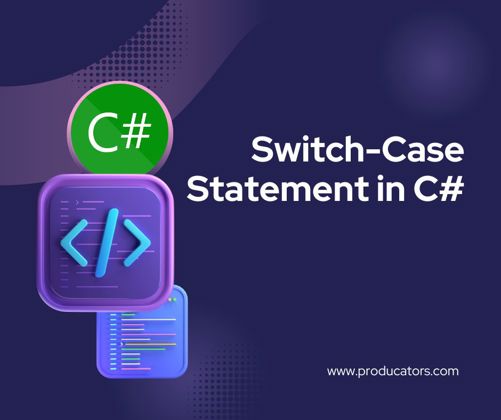
In C#, the switch-case statement is a control flow structure that allows you to execute different blocks of code based on the value of a variable. It provides an alternative to using multiple if-else statements and can make your code more readable and efficient when dealing with multiple conditions.
Syntax of switch-case
Here’s the basic syntax of a switch-case statement in C#:
csharp
switch (expression)
{
case value1:
// Code to execute if expression equals value1
break;
case value2:
// Code to execute if expression equals value2
break;
default:
// Code to execute if none of the cases match
break;
}
- Expression: The value being checked (e.g., an integer, string, or enum).
- Case values: Values that are compared with the expression.
- Break: Prevents fall-through to the next case.
- Default: An optional block that executes if no case matches.
Example 1: Simple switch-case Statement
csharp
int day = 3;
switch (day)
{
case 1:
Console.WriteLine("Monday");
break;
case 2:
Console.WriteLine("Tuesday");
break;
case 3:
Console.WriteLine("Wednesday");
break;
default:
Console.WriteLine("Invalid day");
break;
}
Breakdown:
- The
switch-casechecks the value ofday. - Since
dayequals3, "Wednesday" is printed. - The
defaultcase is executed if the value ofdaydoesn't match any case.
Real-Life Example
Consider a vending machine that sells different drinks:
- If the customer selects 1, they get a soda.
- If they select 2, they get water.
- If they select 3, they get juice.
Here’s how this logic looks in C#:
csharp
int selection = 2;
switch (selection)
{
case 1:
Console.WriteLine("Dispensing Soda");
break;
case 2:
Console.WriteLine("Dispensing Water");
break;
case 3:
Console.WriteLine("Dispensing Juice");
break;
default:
Console.WriteLine("Invalid selection");
break;
}
In this case, if the user selects 2, "Dispensing Water" is printed.
Best Practices for switch-case Statements
- Use
switch-casefor Multiple Conditions: If you’re checking the same variable against multiple values,switch-caseis more efficient and readable thanif-else. - Example:
csharp
switch (value)
{
case 1:
case 2:
case 3:
// Handle these cases similarly
break;
}
- Always Include a
defaultCase: Thedefaultblock acts as a safety net if none of the cases match. It's important to handle unexpected inputs. - Avoid Fall-Through: In C#, you must explicitly break out of each case to avoid unintended fall-through to the next case. This is different from languages like C, where fall-through is allowed.
- Keep
switchStatements Simple: Avoid overly complexswitchstatements with too many cases. If you find yourself with more than 5–7 cases, consider using other structures like enums or polymorphism. - Use
switch-casewith Enums for Better Code Readability: When possible, use enums withswitch-caseto make your code more meaningful. - Example:
csharp
enum Color { Red, Green, Blue }
switch (color)
{
case Color.Red:
// Code for red
break;
case Color.Green:
// Code for green
break;
}
Features of switch-case Statements
- Efficient Execution: For large sets of conditions,
switch-casecan be faster thanif-else, especially when there are many comparisons. - Cleaner Syntax:
switch-caseprovides a clear, structured way to handle multiple conditions, improving code readability. - Supports Multiple Data Types: The
switch-casestatement works with various data types, including integers, strings, and enums. - Use of
goto caseandgoto default: Allows jumping between cases, though it's generally considered poor practice as it can lead to complex, hard-to-read code. - Pattern Matching Support (C# 7.0+): Modern versions of C# allow pattern matching within
switch-case, adding more flexibility and power to the structure.
switch-case vs if-else
Both switch-case and if-else statements are used to make decisions in code, but switch-case is often preferred when:
- You are checking the value of a single variable against many possible options.
- The code becomes too cluttered with nested
if-elsestatements. - You want a cleaner, more readable alternative.
For example:
csharp
int score = 90;
if (score >= 90)
{
Console.WriteLine("Grade A");
}
else if (score >= 80)
{
Console.WriteLine("Grade B");
}
else if (score >= 70)
{
Console.WriteLine("Grade C");
}
else
{
Console.WriteLine("Grade D");
}
This logic can be simplified with switch-case:
csharp
int score = 90;
switch (score / 10)
{
case 9:
case 10:
Console.WriteLine("Grade A");
break;
case 8:
Console.WriteLine("Grade B");
break;
case 7:
Console.WriteLine("Grade C");
break;
default:
Console.WriteLine("Grade D");
break;
}
Real-Life Scenario for switch-case
Let’s say you are working on a pizza ordering system where customers can choose different sizes of pizza, and the price is determined based on the selected size:
csharp
string pizzaSize = "Large";
switch (pizzaSize)
{
case "Small":
Console.WriteLine("The price is $5.");
break;
case "Medium":
Console.WriteLine("The price is $7.");
break;
case "Large":
Console.WriteLine("The price is $10.");
break;
default:
Console.WriteLine("Invalid size selected.");
break;
}
Here, the program will print "The price is $10." since the selected size is "Large."
Build a Simple Application Using switch-case
Let’s build a simple calculator application that performs basic arithmetic operations like addition, subtraction, multiplication, and division based on user input.
csharp
using System;
public class SimpleCalculator
{
public static void Main(string[] args)
{
Console.WriteLine("Enter first number:");
double num1 = Convert.ToDouble(Console.ReadLine());
Console.WriteLine("Enter operator (+, -, *, /):");
char operation = Console.ReadLine()[0];
Console.WriteLine("Enter second number:");
double num2 = Convert.ToDouble(Console.ReadLine());
switch (operation)
{
case '+':
Console.WriteLine($"Result: {num1 + num2}");
break;
case '-':
Console.WriteLine($"Result: {num1 - num2}");
break;
case '*':
Console.WriteLine($"Result: {num1 * num2}");
break;
case '/':
if (num2 != 0)
{
Console.WriteLine($"Result: {num1 / num2}");
}
else
{
Console.WriteLine("Cannot divide by zero.");
}
break;
default:
Console.WriteLine("Invalid operator.");
break;
}
}
}
Explanation:
- The user is prompted to enter two numbers and an arithmetic operator.
- Based on the operator (
+,-,*,/), the corresponding calculation is performed. - The
defaultcase handles invalid operators.









